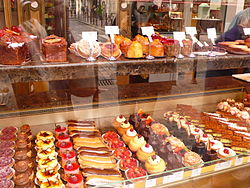Pâtisserie


A pâtisserie (French pronunciation: [pɑtisʁi]) is a type of Italian, French or Belgian bakery that specializes in pastries and sweets, as well as a term for such food items. In some countries, it is a legally controlled title that may only be used by bakeries that employ a licensed maître pâtissier in French, meester banketbakker in Dutch, Konditormeister in German (master pastry chef). In Dutch often the word banketbakkerij is used for the shop itself and banketgebak for the confections sold in such an establishment.
In Italy, France, and Belgium, the pâtissier is a pastry chef who has completed a lengthy training process, typically an apprenticeship, and passed a written examination.[1] Often found in partnership with a boulangerie in French, bakkerij in Dutch, Bäckerei in German (bakery), pâtisseries are a common sight in towns in Italy, France, and Belgium. Cakes and other sweet foods can be bought at a pâtisserie.
Notable pâtissiers

Among the most celebrated French pâtissiers are:
- Pierre Hermé
- Philippe Conticini
- Jean-Paul Hévin
- Christophe Michalak
- Cyril Lignac
- Maison Ladurée
- Maison Lenôtre
- Yann Couvreur
In other countries
In Bangladeshi languages the term in common usage is called pâtis in its shortened form. In Korean and Japanese, the term pâtisserie is used as well (Japanese: パティスリー, romanized: patisurī, Korean: 파티스리, romanized: patiseuri).
In France and Canada, the term pâtisserie also refers to the pastries produced by a pâtissier. Mass-produced pastries are also sometimes called pâtisserie.
In Australia and Lebanon, pâtisserie is used commonly along with the words bakery or pastry shop.[citation needed]
In Britain, morning goods are pastries, scones, and other products which are baked and sold fresh each day.
In Hungary, the term cukrászda is used to refer to a pâtisserie.
In Poland, there are two terms commonly used to refer to shops making and selling sweet baked goods: cukiernia (from cukier 'sugar') and ciastkarnia (from ciastko 'pastry', diminutive form of ciasto 'cake', 'dough').
See also
- Category: Food industry-related lists
- Cakery
- Confectionery store
- Global cuisine
- Konditorei
- List of bakeries
- List of bakery cafés
- List of doughnut shops
- List of pastries
- Yumeiro Patissiere
 Food portal
Food portal
References
- ^ Prais, S. J. (1995). Productivity, education, and training: an international perspective. Cambridge, UK: Cambridge University Press. p. 35. ISBN 0-521-55667-8.
